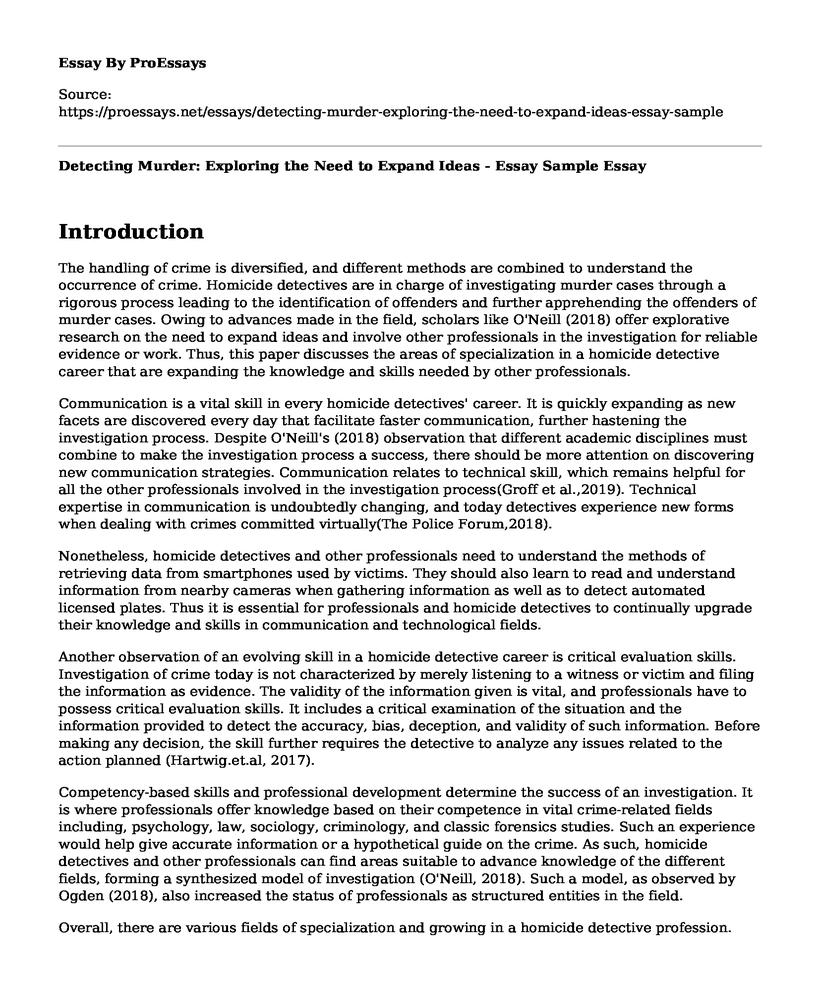Introduction
The handling of crime is diversified, and different methods are combined to understand the occurrence of crime. Homicide detectives are in charge of investigating murder cases through a rigorous process leading to the identification of offenders and further apprehending the offenders of murder cases. Owing to advances made in the field, scholars like O'Neill (2018) offer explorative research on the need to expand ideas and involve other professionals in the investigation for reliable evidence or work. Thus, this paper discusses the areas of specialization in a homicide detective career that are expanding the knowledge and skills needed by other professionals.
Communication is a vital skill in every homicide detectives' career. It is quickly expanding as new facets are discovered every day that facilitate faster communication, further hastening the investigation process. Despite O'Neill's (2018) observation that different academic disciplines must combine to make the investigation process a success, there should be more attention on discovering new communication strategies. Communication relates to technical skill, which remains helpful for all the other professionals involved in the investigation process(Groff et al.,2019). Technical expertise in communication is undoubtedly changing, and today detectives experience new forms when dealing with crimes committed virtually(The Police Forum,2018).
Nonetheless, homicide detectives and other professionals need to understand the methods of retrieving data from smartphones used by victims. They should also learn to read and understand information from nearby cameras when gathering information as well as to detect automated licensed plates. Thus it is essential for professionals and homicide detectives to continually upgrade their knowledge and skills in communication and technological fields.
Another observation of an evolving skill in a homicide detective career is critical evaluation skills. Investigation of crime today is not characterized by merely listening to a witness or victim and filing the information as evidence. The validity of the information given is vital, and professionals have to possess critical evaluation skills. It includes a critical examination of the situation and the information provided to detect the accuracy, bias, deception, and validity of such information. Before making any decision, the skill further requires the detective to analyze any issues related to the action planned (Hartwig.et.al, 2017).
Competency-based skills and professional development determine the success of an investigation. It is where professionals offer knowledge based on their competence in vital crime-related fields including, psychology, law, sociology, criminology, and classic forensics studies. Such an experience would help give accurate information or a hypothetical guide on the crime. As such, homicide detectives and other professionals can find areas suitable to advance knowledge of the different fields, forming a synthesized model of investigation (O'Neill, 2018). Such a model, as observed by Ogden (2018), also increased the status of professionals as structured entities in the field.
Overall, there are various fields of specialization and growing in a homicide detective profession. Communication, technical skills, critical evaluation, as well as professional development, are some of the fields. Professionals and detectives should strive to update their skills and knowledge in these areas to improve their service delivery.
References
Groff, E. R., Johnson, S. D., & Thornton, A. (2019). State of the art in agent-based modeling of urban crime: An overview. Journal of Quantitative Criminology, 35(1), 155-193. Retrieved from https://link.springer.com/article/10.1007/s10940-018-9376-y
Hartwig, M., Voss, J. A., Brimbal, L., & Wallace, D. B. (2017). Investment Professionals' Ability to Detect Deception: Accuracy, Bias, and Metacognitive Realism. Journal of Behavioral Finance, 18(1), 1-13. Retrieved from https://doi.org/10.1080/15427560.2017.1276069
O'Neill, M. (2018). The art and science of investigation. In M. O'Neill, The Psychology of Criminal Investigation (pp. 31-51). London: Routledge. Retrieved from https://www.taylorfrancis.com/books/e/9781315637211/chapters/10.4324/9781315637211-3
Ogden, P. (2018). The perceptions of new to role detective officers in relation to their professional accreditation in northern police service. The University of Huddersfield. The University of Huddersfield. Retrieved from http://eprints.hud.ac.uk/id/eprint/35017/
The Police Forum (2018, January). The Changing Nature of Crime And Criminal Investigations. Retrieved from Policeforum.org: https://www.policeforum.org/assets/ChangingNatureofCrime.pdf
Cite this page
Detecting Murder: Exploring the Need to Expand Ideas - Essay Sample. (2023, May 11). Retrieved from https://proessays.net/essays/detecting-murder-exploring-the-need-to-expand-ideas-essay-sample
If you are the original author of this essay and no longer wish to have it published on the ProEssays website, please click below to request its removal:
- Paper Example on Death Penalty
- Advocates for Child Abuse Victims Essay Example
- Analysis of the Tax and Job Acts of 2017 Essay Example
- The VA Medicinal Cannabis Research Act (2018) Essay Example
- Criminals in Correctional Facilities: Challenges for Reintegration - Essay Sample
- Essay on Sociology and Holocaust/Genocide Studies: Analyzing Human Rights Violations
- Should Euthanasia Be Legalized? An Argumentative Essay Example







